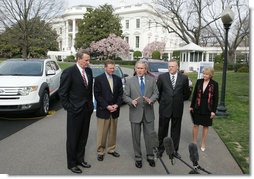
- Afghanistan
- Africa
- Budget Management
- Defense
- Economy
- Education
- Energy
- Environment
- Global Diplomacy
- Health Care
- Homeland Security
- Immigration
- International Trade
- Iraq
- Judicial Nominations
- Middle East
- National Security
- Veterans
|
Home >
News & Policies >
March 2007
|
For Immediate Release
Office of the Press Secretary
March 26, 2007
President Bush Participates in Demonstration of Alternative Fuel Vehicles with CEOs of Ford, General Motors and DaimlerChrysler
The South Lawn
11:11 A.M. EDT
THE PRESIDENT: I've just spent quite a while talking to our CEOs of American automobile companies. And I was interested in their take on my goal of reducing gasoline consumption by 20 percent over the next 10 years.
I found it very interesting that by 2012, 50 percent of the automobiles in America will be flex-fuel vehicles.* That means that the American consumer will be able to either use gasoline or ethanol, depending upon, obviously, price and convenience. That's a major technological breakthrough for the country. If you want to reduce gasoline usage, like I believe we need to do so for national security reasons, as well as for environmental concerns, the consumer has got to be in a position to make a rational choice. And so I appreciate very much the fact that American automobile manufacturers recognize the reality of the world in which we live and are using new technologies to give the consumers different options.
 Right now, most of our ethanol is made from corn. But the federal government is spending a lot of money to try to develop new technologies that will mean that ethanol could be made from wood chips or switchgrass. Part of that request is embedded in a request to the Congress, and I would hope that Congress would move expeditiously on our plan to reduce gasoline usage by 20 percent over the next 10 years. It's in our national security interest that we do this, it's in economic security interest we do it, and all at the same time, it will help us be better stewards of the environment.
Right now, most of our ethanol is made from corn. But the federal government is spending a lot of money to try to develop new technologies that will mean that ethanol could be made from wood chips or switchgrass. Part of that request is embedded in a request to the Congress, and I would hope that Congress would move expeditiously on our plan to reduce gasoline usage by 20 percent over the next 10 years. It's in our national security interest that we do this, it's in economic security interest we do it, and all at the same time, it will help us be better stewards of the environment.
And now I'd like to ask these gentlemen to make a few comments.
MR. WAGONER: Yes, I'd just -- from General Motors' perspective, we very much share the President's vision, and we definitely see a path through to both lower oil consumption, lower amounts of imported oil, and fewer carbon emissions. And obviously, a near-term opportunity that we are moving on right now, as the President cited, is flex-fuel vehicles that are powered by E85 ethanol. There are millions on the road today. As a group, we've agreed to double our production by the year 2010, and then have 50 percent of our production E85-capable by the year 2012. This makes a big difference, and there's nothing that can be done which can reduce the curve of growth in imported oil and actually turn it down like using E85, taking advantage of what's there today.
So we look forward to the opportunity to work closely with the administration and Congress to increase the production of ethanol and to improve the distribution. And on the manufacturer's side, we look very, very much forward to playing our role in that process, as well.
MR. MULALLY: Well, I might add to what Rick said, that we at Ford absolutely are supportive of the President's goal, both for energy efficiency and independence, and to be good stewards of our environment.
One of the neat things about the conversation, again, today, on the continuing dialogue that we've had, is being able to -- the United States system to have options and have flexibility. And the fact that we have ethanol solutions today, hybrids coming along, and plus hydrogen and fuel cells and new battery technology, gives some great options to satisfy our need for flexibility, as well as being good stewards of the environment.
So Mr. President, we appreciate the leadership and we look forward to working with you going forward.
MR. LASORDA: Well, DaimlerChrysler, which includes the Mercedes car group, the Freightliner and other truck divisions in the Chrysler group, we've committed, as well, by 2012, to have 50 percent of our production not only in E85, but biodiesel. This Jeep Grand Cherokee here today is going into production as we speak, being shipped from the factory with B5.
So we've very committed to this, as well, and we think this is the answer for America to lower our dependence on foreign oil.
Thank you.
THE PRESIDENT: One of the things that I think it's important for American taxpayers to understand is that we're using some of their dollars to promote new technologies, and we're working with these CEOs and their respective companies to advance new technologies. They're on the leading edge of technological change, and it's in our interest to help promote these new technologies that are coming to the market.
And I'm excited about the future. I'm optimistic we can meet our goal. I look forward to working with Congress to do so, and I appreciate you all coming today.
Thank you.
END 11:16 A.M. EDT
* Ford, General Motors and DaimlerChysler ("The Big Three"), are committed to producing 50 percent of their new vehicles as flex-fuel vehicles.


